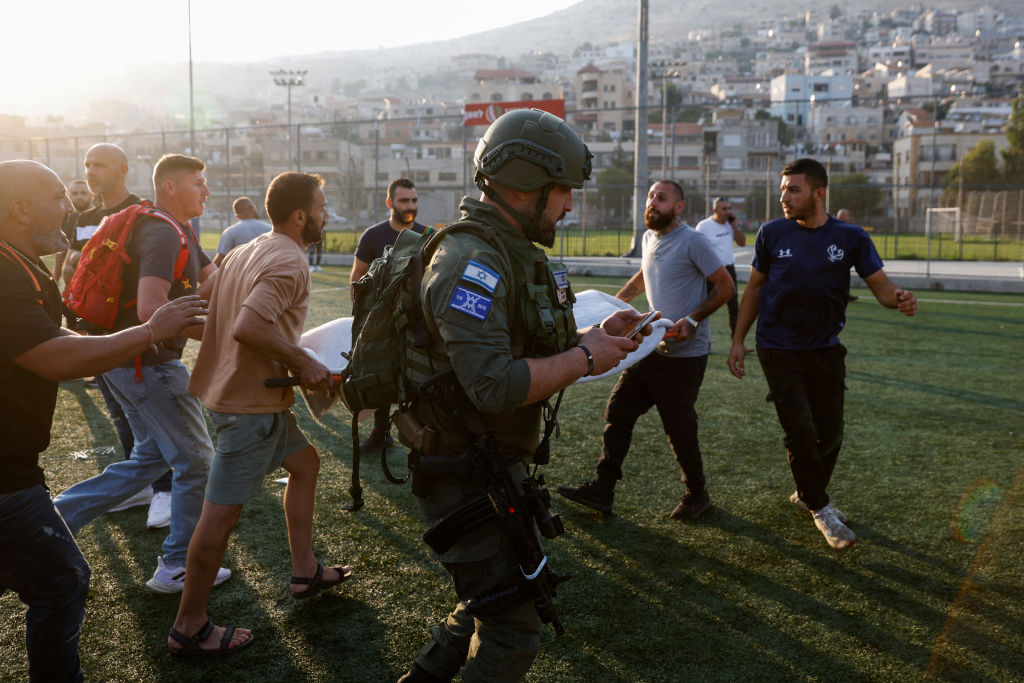Since the attacks on 7 October, war between Israel and the Lebanese militant group Hezbollah has constantly appeared at once imminent and at least a few weeks away. Despite various flare-ups and escalations, both sides appeared unwilling to begin a full-blown conflict, and a consensus had been emerging that an all-out war would not happen until autumn at the earliest — and not before Israel had wound down its campaign in Gaza.
Events this weekend have disrupted that consensus. The strike on the Druze village of Majdal Shams which killed 12 people, 11 of them children, has notably altered public opinion inside Israel.
Previously, different sections of Israeli society had dampened talk of war with Hezbollah, for various reasons: members of the military, because they do not see it as feasible while they are still deployed in Gaza; Left-wingers, because they wish to avoid the war at all costs; and many on the Likudnik Right, who see calls for a war in the north as implicitly critical of Prime Minister Benjamin Netanyahu due to his inability to protect that part of the country.
The recent attack has shifted the discourse. There was a special edition of the main Israeli news show dedicated to the event, which has happened only rarely since 7 October. What’s more, it is seen as a departure from the usual round of tit-for-tat strikes in the north, which were seen as tolerable — despite them resulting in 45 deaths, leaving a large swathe of Israeli territory uninhabitable, and displacing tens of thousands of people for almost 10 months.
It is also significant that it was Druze who were killed, and in an occupied territory rather than Israel proper. Despite being Arabs, the Druze within the 1948 borders of Israel are patriotic and fight in the Israeli military. This is different for the Druze in the Golan Heights, most of whom do not accept the occupation of the area that has been in place since 1967 and still consider themselves to be Syrian.
But that doesn’t mean they support Hezbollah, and the incident has created a desire for revenge among the Druze. In response to the deaths, local community leader Sheikh Muafak Tarif stated that “a proper country cannot allow the continued harming of its citizens and residents. This [has been] the ongoing reality for nine months in northern communities. This evening crossed all possible lines.”
Israeli government ministers who attended the funerals were heckled by some mourners. One said to Finance Minister Bezalel Smotrich: “We don’t want you in the Golan Heights. Get out of here! You’re a murderer!”
But others complained about the lack of action against Hezbollah: “Our children should play football in peace,” one man said, adding that “I have been in the reserves for ten months” without any end in sight. When Economy Minister Nir Barkat approached him, he was told: “Don’t shake my hand, don’t silence me. Woe to you if you don’t [hit] them back.” Meanwhile, Druze living across the border in Syria have also condemned the attack. An all-out war is now much more likely than it was last week, although the time frame remains unpredictable.
Hezbollah didn’t intend to cause civilian casualties, and certainly doesn’t want a full-blown conflict with Israel. Since Saturday, the group has been trying to de-escalate: as soon as it was reported that children had died, Hezbollah has alternated between denying responsibility and insisting that it was aiming for a military installation on nearby Mount Hermon. Its leaders would like to back down, but if Israel’s reaction goes beyond the retaliatory strikes launched so far, they might not be able to.
Earlier today, the Iranian Foreign Ministry warned Israel that any “military adventures” in Lebanon could lead to “unforeseen consequences”. If Israel carries out further strikes in retaliation for the Majdal Shams deaths — as current public opinion demands — then it may be hard for Hezbollah not to retaliate in turn, especially given the warning of its Iranian sponsors.
Since 7 October, it has always been likely that an accident or unforeseen event, rather than a premeditated action, would be the trigger of any war between Israel and Hezbollah, as both sides wish to avoid such an inevitably destructive conflict. Unfortunately, Saturday’s strike may well have been that incident.











Join the discussion
Join like minded readers that support our journalism by becoming a paid subscriber
To join the discussion in the comments, become a paid subscriber.
Join like minded readers that support our journalism, read unlimited articles and enjoy other subscriber-only benefits.
Subscribe